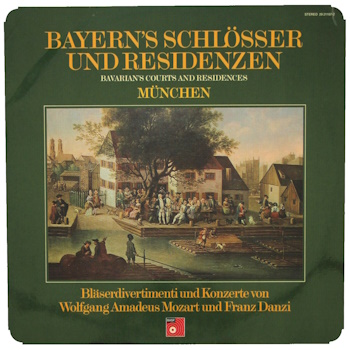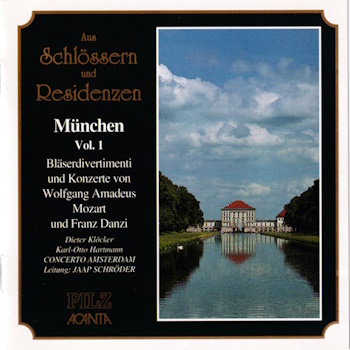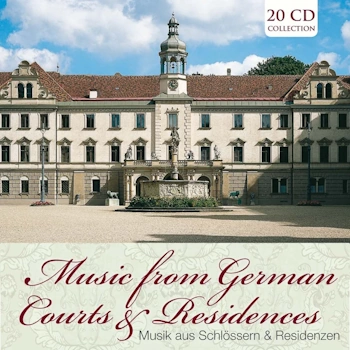 |
|
2 LPs
- 29 21107-2 - (p) 1972
|
 |
| 2 CDs -
44 2151-2 - (c) 1993 |
|
| MÜNCHEN |
|
|
|
|
|
|
|
| Wolfgang
Amadeus MOZART (1756-1791) |
Divertimento
B-Dur für 2 Klarinetten, 2 Hörner
und Fagotte, KV 196f (Anh. 227)
|
LP 1 |
|
13' 12" |
|
|
-
Allegro
|
|
2' 36" |
|
A1 |
|
-
Menuetto
|
|
2' 13" |
|
A2 |
|
-
Adagio
|
|
3' 00" |
|
A3 |
|
-
Menuetto |
|
2' 37" |
|
A4 |
|
-
Finale: Andantino
|
|
2' 39" |
|
A5 |
|
(Consortium
Classicum)
|
|
|
|
|
| Wolfgang Amadeus MOZART |
Divertimento
Es-Dur für 2 Klarinetten, 2
Hörner und 2 Fagotte, KV 196e
(Anh. 226) |
LP 1 |
|
20' 01" |
|
|
-
Allegro moderato
|
|
3' 12" |
|
A6 |
|
-
Menuetto |
|
5' 41" |
|
A7 |
|
-
Romanze: Adagio ma un poco andante |
|
4' 02" |
|
B1 |
|
-
Menuetto: Allegretto |
|
3' 33" |
|
B2 |
|
-
Rondo: Andante
|
|
3' 28" |
|
B3 |
|
(Consortium
Classicum)
|
|
|
|
|
| Franz DANZI (1763-1826) |
Sextett
Es- Dur für 2 Klarinetten, 2
Hörner und 2 Fagotte
|
LP 1 |
|
14' 10" |
|
|
-
Allegro
|
|
5' 04" |
|
B4 |
|
-
Andante
|
|
3' 19" |
|
B5 |
|
-
Menuetto: Allegro
|
|
2' 42" |
|
B6 |
|
-
Allegretto |
|
3' 02" |
|
B7 |
|
(Consortium
Classicum)
|
|
|
|
|
Franz DANZI
|
Konzert
F-Dur für Fagott und Orchester |
LP 2 |
|
18' 44" |
|
|
-
Allegro |
|
8' 52" |
|
C1 |
|
-
Andante
|
|
2' 40" |
|
C2 |
|
-
Polacca: Allegretto |
|
7' 07" |
|
C3 |
|
(Karl-Otto
Hartmann: Fagott | Concerto
Amsterdam) |
|
|
|
|
| Franz DANZI |
Sinfonia
concertante B-Dur für Klarinette,
FAgott und Orchester |
LP 2 |
|
17' 34" |
|
|
-
Allegretto
|
|
7' 09" |
|
C4 |
|
-
Andante moderato
|
|
4' 27" |
|
C5 |
|
-
Allegretto
|
|
5' 53" |
|
C6 |
|
(Dieter Klöcker:
Klarinette | Karl-Otto Hartmann:
Fagott | Concerto Amsterdam) |
|
|
|
|
|
|
|
|
| CONSORTIUM CLASSICUM |
CONCERTO AMSTERDAM |
|
| - Dieter Klöcker, Klarinette |
Jaap SCHRÖDER,
Leitung |
|
| - Waldemar Wandel, Klarinette |
|
|
| - Werner Meyendorf,
Horn |
|
|
| - Nikolaus Grüger, Horn
|
|
|
| - Karl- Otto
Hartmann, Fagott |
|
|
| - Eberhard
Buschmann, Fagott |
|
|
|
|
|
|
Recorded
at: |
|
-
|
|
|
Live / Studio
|
|
Studio |
|
|
Producer |
|
-
|
|
|
Balance engineer
|
|
-
|
|
|
First LP Edition
|
|
BASF
| 29 21107-2 | 2 LPs | durata
47' 23" - 36' 18" | (p)
1972
|
|
|
First CD Edition |
|
PILZ
- ACANTA | 44 2151-2 | 2 CDs |
durata 47' 23" - 36' 18" | (c)
1993 | ADD
|
|
|
Note |
|
-
|
|
|
|
|
Musik
aus Schlössernb &
Residenzen
(20 CD Collection)

Membran |
234355 | (c) 2016
(in CD 13
& 14)
|
A
comprehensive description of the
musical life in Munich in the
1770’s has been left to us by an
unknown contemporary observer
who wrote: „(…could be found): A
well organised orchestra under
its maestro Bernasconi, who, as
his numerous compositions
showed, devoted much of his time
and energy to it; an Italian
opera which ran during Carnival
time, usually with a work
composed by some accomplished
foreign master and performed by
famous singers, including in
their time such brilliant
castratos as Farinelli and
Guadagni, to which were
admitted, free of charge, the
numerous music-lovers and
members of the educated classes
who eagerly poured in from the
neighbouring seminaries,
monasteries and country towns to
glean new ideas for their own
musical efforts of the coming
year; frequent court concerts of
amateur music-making; and,
almost without exception, a
daily chamber music concert, an
entertainment which the Elector,
himself a skillful performer on
the viola da pompa and an
esteemed amateur composer, much
liked to attend of an evening.
In addition, there were musical
performances of various kinds in
all the larger churches of the
city – the Jesuits enjoying the
full splendour of the majestic
sounds of trumpets and drums,
the Augustinians favouring a
more modest, gentle mode of
expression: during Lent
meditations and oratorios,
including Metastasio’s passions,
from the pens of the solemn
Jommelli and the well-pleasing
Mysliweczek.“
Wolfgang Amadeus Mozart appears
to have been greatly charmed by
the city of Munich („I love
being here“ he is known to have
exclaimed). Just how attractive
his stay there in 1784 must have
been, we can read from his own
travel notes: „This city is one
of the most beautiful in all
Germany, as everyone here will
agree. One can live here very
cheaply, very comfortably and
very freely. Paradisial gardens,
palaces worthy of the gods,
incomparable concert
performances and theatrical
productions as magical as
fairyland.“ After the oppressive
narrow atmosphere of the life in
Salzburg, Munich’s more generous
living and abundance of
stimulating new ideas and
opportunities must have shown up
in especially glowing colours to
Mozart. It was in the sixties
that Mozart had actually first
visited Munich. The child
prodigy and his sister, Nannerl,
had been taken on tour by their
father, Leopold Mozart, and
invited to play for the Elector
at his Residenz and at the
Nymphenburg Palace, and for Duke
Clemens at his Garden Schloss
just outside the city. Later, in
1774, he was commissioned to
write an opera for Munich - „La
Finta giardiniera“. Even after
the first rehearsal Father
Leopold was able to write home
proudly to Salzburg, „The whole
orchestra and everyone that
attended the rehearsal say that
they have never heard any music
more beautiful, an opera where
each aria is as lovely as next.
Whereever we go people are
talking about it.“ The premiere
was on January 13th, 1775, at
the Salvator Theatre. Mozart
wrote to his mother, „God be
praised! Yesterday, on the
thirteenth, my opera was
launched, and was such a success
with the audience, Mama, that I
just could not begin to describe
you the noise! In the first
place the theatre was packed so
full that lots of people had to
be turned away. And after each
aria there was such a terrible
din with all the clapping and
yells of „viva maestro“.“
Right up to the end of Carnival
time the Mozarts were busy
attending all the masquerades,
making the most of their
opportunity. On February 15th
Leopold Mozart wrote; „We have
decided not to go to a
masquerade today, we must rest.
It will be the first one we have
missed. „ During the remaining
time Mozart occupied himself
with composing. Probably
stemming from this period are a
mass, a Kyrie fragment, an
offertory, a piano sonata, a
sonata for bassoon and
violoncello and the two Wind
Divertimenti KV 196 e and f.
These two last-named pieces are
gay, light-hearted works, each
consisting of five movements,
typical of the sort of music
that would be played by the
court or town musicians during
dinners or at small social
gatherings to entertain the
guests. Mozart himself was
treated to a similar musical
diversion about two years later
when he was lodging with the
music-loving innkeeper Herr
Albert, who kept a winecellar in
the Kaufingergasse in Munich.
Mozart reported: „At about half
past nine a little band of five
musicians arrived, 2 clarinets,
2 horns and 1 bassoon. Herr
Albert, whose name-day it is
tomorrow, had let them play in
his honour and in mine, and they
did not play too badly either.
They were the same people that
play for the dancing at
Albert’s.“
A quarter of a century later,
around 1800, Munich was a city
with a population of
45 000. In the Residenz Theatre,
built by Francois Cuvilliés,
about 40 performances of operas
were being given a year. In
addition to the works of
Italian, French and Viennese
masters a fair number of operas
by local composers were now
being included in the
repertoire.
A contemporary printed guide to
the city lists the following
musical entertainments: „At
court, from time to time,
amateur concerts are organised
in the Hercules Room at the
Residenz, particularly on
gala-days; more frequently,
chamber music concerts with
vocal and instrumental music are
given. The former entertainment
may be attended not only by the
courtiers themselves but also by
the entire court household and,
behind a small barrier, more
humble members of the public.
The latter concerts, of chamber
music, are given only by a small
selected group of performers. In
the ballroom, every year, there
are also 12 amateur concerts
given with admission through an
advance payment of 11 guilders.
The profit thus made, after all
costs have been deducted, is
allotted to the theatre funds.“
In 1778 the court orchestra
gained considerable
reinforcement through the
arrival of the Mannheim
Orchestra with Elector Karl
Theodor. It now could boast a
number of accomplished musicians
and composers, whose
compositions now made up the
main part of its concert
programmes. Above all, the works
of the Kapellmeister Winter and
Danzi enjoyed great popularity.
Franz Danzi, who had known
Mozart personally, started off
as a violoncellist in the court
orchestra, and after being
granted many leaves of absence
over the years for opera and
concert performances in Saxony,
Bohemia and Italy, where he
toured with his wife Margarethe
(a pupil of Leopold Mozart), he
finally, in 1798, was appointed
its Vice Kapellmeister. He later
became a close friend of Carl
Maria von Weber and is, with
justification, considered an
important forerunner of the
German musical Romantic
Movement.
Danzi’s influence on Weber, who
was 23 years his junior, may be
easily traced, for example, in
the Concerto in F major for
Bassoon and Orchestra with its
concluding Polacca, which
clearly points towards the style
of similar final movements in
Weber’s solo concertos. In this
work, as in the Double Concerto
in D major for Clarinet and
Bassoon, the melodic wealth and
harmonic colourfulness
characteristic of Danzi’s music
are set off to particularly
charming advantage. Internal
disputes with his colleague
Peter von Winter caused Danzi to
leave Munich in 1807 and take up
another position, as court
Kapellmeister in Stuttgart. His
compositions, however, long
remained favourites on the
numerous concert programmes and
in the repertoires of the Munich
church choirs.
Dr. Robert
Münster
|
|